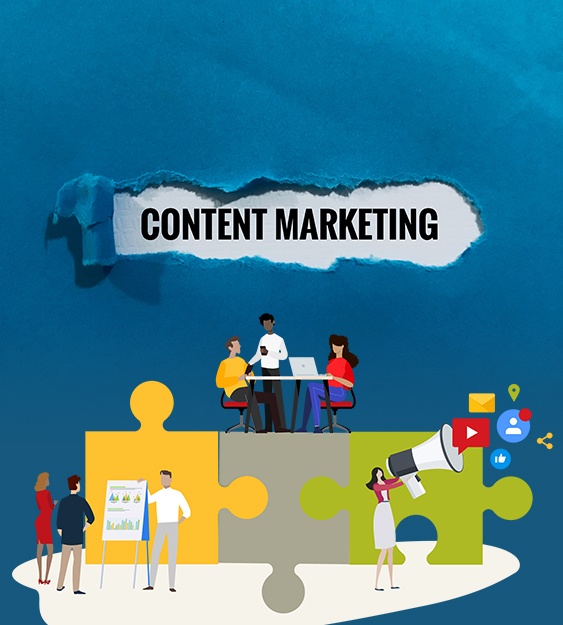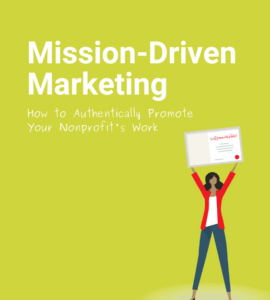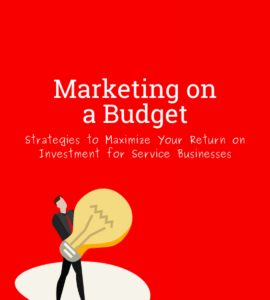If you are a small or medium-sized business, content marketing can be a powerful tool to help you build brand awareness, credibility, and customer loyalty.
Content marketing is the strategic process of creating, publishing, and distributing content to promote your brand. Valuable and engaging content serves as a consistent source of lead generation for customers to inquire about or purchase your product or service.
If you are a small or medium-sized business, content marketing can be a powerful tool to help you build brand awareness, credibility, and customer loyalty. Although traditional methods such as handouts, print ads, and direct mail, are still effective, content marketing allows you to apply a qualitative approach to your efforts.
A Qualitative Approach To Building Brand Authority
First, it is important to determine how do you want to measure your brand’s performance. Identifying the right metrics will help you track your progress as you work towards reaching your goals. Also, your data will help you make future decisions in your business.
Your content marketing metrics may vary based on your intent on each platform. We will share the five most common metrics.
Organic Search Traffic
Your website should serve as a content hub, your centralized location for your primary content and referral, outside traffic should be directed back to your website. This can be measured by using Google Analytics and Google Search Console. Google Analytics will allow you to track web traffic per page, engagement, location, demographics, and a lot more.
Keyword Rankings
Keyword rankings determine the placement of your website on the search engine results page (SERP). Understanding your ranking will help gauge the effectiveness of your content and search engine optimization (SEO) strategy.
Impressions
Each social media platform allows you to track impressions, the total number of times your content was shown to users. Tracking impressions will help you determine how much exposure your content is receiving and if you want to utilize paid ads.
Followers/Subscriber Growth
Follower or subscriber growth can be tracked over a specific time period. Follower growth is a direct correlation to reaching a broader audience, which means you are incrementally enhancing your brand awareness. This is also one of the easiest metrics you can track and compare your performance to your competitor.
Brand Mentions
Brand mentions are references to your brand, product, or service online. Monitoring brand mentions allows you to see if you have a positive influence in your industry. You can track your personal or company name as well as keywords if you want to contribute to online conversations.
How Content Marketing Benefits Branding and Marketing Efforts
There are ways in which this marketing can benefit and elevate your branding and marketing endeavors.
Build Your Brand Authority and Trust
Content marketing allows your business to position itself as the authority in its industry. When you consistently deliver high-quality and informative content, whether through blog posts, podcasts, or videos, you can establish trust with your audience. Consumers will perceive your brand as a reliable source of information and will select your products or services over your competitors.
Enhance Your Brand Visibility
Content creation and distribution across various platforms enhance your brand’s visibility. As your content reaches a broader audience, it contributes to brand awareness and credibility. Over time, this visibility can increase traffic – both online and offline – amplifying your marketing efforts.
Improving Search Engine Visibility (SEO)
Google, the primary search engine, ranks relevant content. It is important to select your top keywords that can be implemented on your web copy and blog posts. Some good practices include removing outdated pages, refreshing high-traffic pages, and publishing new content on a regular basis. A high-ranked website converts to increased organic traffic which equals to brand awareness.
Engaging Your Target Audience
Your content should be customized communication with your audience on their preferred platform. Whether through storytelling, educational articles, or interactive content, you can engage your target demographic in a meaningful way. This engagement fosters a sense of community and loyalty, making your brand more memorable and repeat business.
Supporting the Sales Funnel
In addition, content contributes to every stage of the sales funnel. Well-crafted content guides potential customers through their buyer’s journey, from creating awareness, generating interest, to nurturing leads and driving conversions. This approach ensures that your marketing efforts are comprehensive and align with the customer’s decision-making process.
Types of Content Marketing
It is important to understand the different types of content marketing. Here are the types you can use for your brand:
Email Marketing
Email marketing remains essential in the content marketing arsenal. From newsletters that provide updates and insights to targeted promotional emails, this channel allows businesses to establish direct communication with their audience.
Blogging
Blogging serves as the cornerstone of content marketing. By regularly publishing informative and relevant articles, your business can position itself as an industry leader.
Social Media Marketing
These are dynamic spaces where your business can connect with its audience on a personal level. Whether it’s through Facebook, Instagram, LinkedIn, Tik-Tok, or X, each platform can help you build a loyal community and drive traffic to your website.
Video Marketing
The rise of video marketing is undeniable. According to Zight, 91% of consumers want to watch more online video content from brands. Create a mix of short and long-form video content that inform, inspire, or entertain your audience. Video has the power to captivate and connect with the audience in ways other formats may fall short.
Lead Generation Content
Your business can create gated content such as ebooks, whitepapers, or case studies, convincing users to share their email in return for valuable insights. This type of content not only educates but also nurtures potential leads.
Infographics
Infographics serve as visual storytellers. Breaking down complex data into easily digestible graphics, infographics are shareable, engaging, and perfect for conveying information quickly and effectively.
Webinars
These will offer a more immersive experience, allowing your business to host live events, workshops, or presentations. The real-time interaction with the audience through Q&A sessions fosters a sense of community and positions your business as an authority in its field.
Interactive Content
Interactive content, such as quizzes, polls, and surveys, goes beyond passive consumption. It encourages active participation, providing you with valuable insights into user preferences.
Podcasting
This is gaining traction as an audio or video-centric content form. With the rising popularity of podcasts, your business can leverage this platform to deliver in-depth discussions, interviews, and storytelling, catering to audiences who prefer consuming content through their ears. In addition, you have the option to be a guest expert on a podcast.
Content Marketing + SEO
One of the anchors of content marketing is search engine optimization also known as SEO. Here is what you should know about the two:
Content Marketing is more than just creating compelling content; it’s about delivering value to your audience. Whether your format is written, audio, or video, the goal is to engage, educate, and build a relationship with your target audience. Quality content not only establishes your brand as an authority but also attracts and retains customers.
On the other hand, SEO is the digital compass that guides search engines to understand and rank your content. It involves optimizing various elements on your website to enhance visibility in search engine results. From keyword research and on-page optimization to backlink building, SEO is the engine that drives organic traffic to your content.
3 Content Marketing Tips
Now that you understand how important content marketing and SEO are for your business, it is time to kickstart the journey. Before you can begin, you need to understand and follow these tips:
Create High-Quality, Relevant Content
Take time to develop a content strategy that aligns with your business goals and resonates with your audience. Creating high-quality, relevant content consistently is key to building your brand.
Check Your Data
Check your data as often as you need to. Maintaining a weekly or monthly tracker can help monitor which pieces of content perform better.
Optimize Your Content
Yes, it is important to create new content, but don’t be afraid to repurpose and optimize your old content. Optimize your content for search engines by incorporating relevant keywords and updating pages. Keep in mind, that your audience is growing and new eyes are watching every day. It is okay to recycle your content on social media.
Contact b.iD Today!
If you want to take your efforts to the next level and achieve sustainable growth, consider partnering with b.iD, your trusted communications agency. Our team of experts specializes in crafting tailored strategies that align with your business objectives and drive tangible results. Whether you need assistance with content marketing, SEO, or a comprehensive digital marketing strategy, we’re here to help you succeed. Schedule a consultation with one of our experts today!
Copyright © 2014-2024 b.iD LLC. All Rights Reserved.
Boutique Creative Agency providing Branding Specialists, Logo, Copywriting, Print & Web Designs, Public Relations, and Marketing solutions in Houston, Texas










